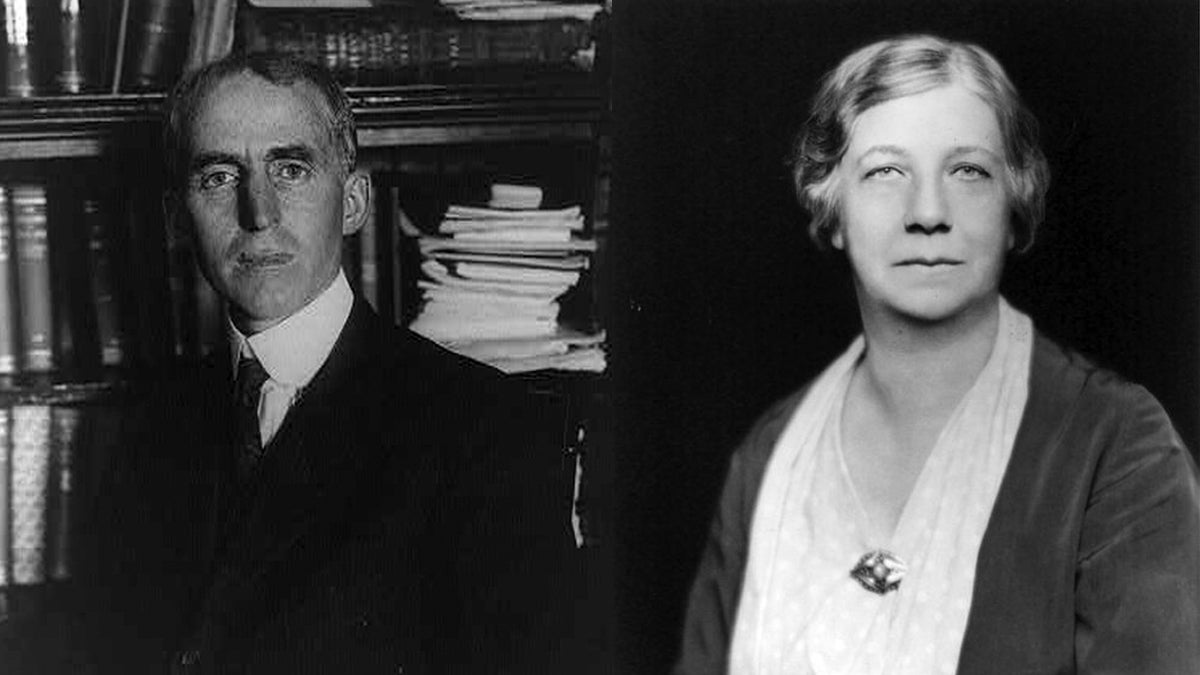Calling all professional historians – ‘come out of the ivory tower’
Listen
Historians Charles and Mary Beard.
“Professors, We Need You!”
So declared a much-discussed column last month by the New York Times’ Nicholas Kristof, who complained that most modern-day academics ignore the lay public. Instead of walling themselves off “like medieval monks,” Kristof wrote, professors should be sharing their knowledge with wider audiences so that it makes a difference in the world.
I’ve been trying to make a similar case to my fellow historians for more than a decade, stressing our duty to serve the public, and it has largely fallen on deaf ears. So lately I’ve been trying a different tack, especially with younger scholars. Although I still believe the public needs you, dear historian, you also need the public. And never more so than right now.
That’s because an increasing fraction of professional historians will not be employed at universities, where traditional tenure-track positions have been in sharp decline. To get jobs, they will need to know how to connect with readers and listeners outside of our guild. All of us know that, at some level, but we haven’t changed our practices in accord with it. We’re like a little boy who is trying to hide and closes his eyes, in the vain hope that nobody will be able to see him.
Once upon a time, the leading members of our discipline wrote books for popular consumption. Charles and Mary Beard, the most original historians of the early 20th century, authored a Book-of-the-Month bestseller; they also wrote several successful school textbooks. So did Carl Becker, another giant of the era, whose own textbook was dedicated to “all teachers…who have endeavored to increase knowledge and promote wisdom in the world.”
At mid-century, top historians like Henry Steele Commager, Oscar Handlin, and Richard Hofstadter cultivated a lay audience. To these authors, democratic citizenship demanded historical awareness; so they purposefully pitched their books at average citizens. They also provided devastating critiques of American habits and institutions, belying our own caricature of the Cold War as an era of banal flag-waving. In The American Political Tradition (1948), for example, Hofstadter claimed that the founding fathers disdained democracy, that Abraham Lincoln was a raw opportunist, and that Theodore Roosevelt pandered to big business. And his book sold over a million copies!
Then came the 1960s and 1970s, when historians brought a new and welcome attention to formerly neglected groups of Americans—especially women, immigrants, and blacks. Condemning the “top-down” approach of our predecessors, we resolved to write a “history from the bottom up.” It would be a “people’s history,” we said, resplendent with the wondrous diversity and complexity of America itself.
But it turned out that the people themselves wanted more books about the founding fathers, Lincoln, and the Roosevelts (Teddy and Franklin). And into that breach stepped a new generation of journalist-historians such as David McCullough and Doris Kearns Goodwin, who wrote grand, best-selling narratives about Great White Men (and, sometimes, Great White Women). The rest of us toiled away on narrow case studies of New England millworkers and Southern sharecroppers, selling a thousand or so copies of each one—if we were lucky.
What if you gave a history party and nobody came? “People’s history” generated astute, original insights about the American past. By and large, however, historians reserved these interpretations for each other. And we ceded popular history to the likes of McCullough and Goodwin, who sometimes put eulogy and celebration over critique and analysis.
To be sure, some professional historians continued to write for lay readers; consider Princeton historian James McPherson, whose Civil War epic Battle Cry of Freedom spent 16 weeks on the New York Times bestseller list in the late 1980s. But as McPherson himself has written, academics started to give him the cold shoulder as soon as his book got hot. If any old Joe can understand you, after all, how deep can you be?
That attitude has to change, and soon, if we want our profession to grow and thrive. Many of the people entering it will not have the luxury of writing only for the profession. America still needs historians, of course, as it struggles to make sense of our irreducibly complex and rapidly changing world. But the profession will wither, and deservedly so, unless it devises new ways to interest and instruct lay audiences.
Historians, The Public Needs You! But you need the public, too. Don’t turn away from it, as so many of us have been taught to do. The job you save may be your student’s. Or your own.
WHYY is your source for fact-based, in-depth journalism and information. As a nonprofit organization, we rely on financial support from readers like you. Please give today.

